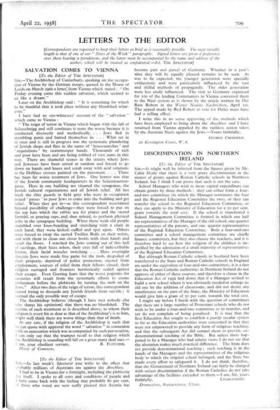DISCRIMINATION IN NORTHERN IRELAND
[To the Editor of THE SPECTATOR] StR,—It might well be inferred from the figures given by Mr. Cahir Healy that there is a very grave discrimination in the matter of grants against Roman Catholic schools in Northern Ireland, but I think I can prove that such is not the case.
School Managers who wish to incur capital expenditure can obtain grants by three methods : they can either form a four- and-two committee (in which the Manager nominates the four and the Regional Education Committee the two), or they can transfer the school to the Regional Education Committee, or they can apply to the Ministry of Education for a 5o per cent. grant towards the total cost. If the school is transferred a School Management Committee is formed in which one half are representatives of the Manager of the old school, one quarter representatives of the parents, and one quarter representatives of the Regional Education Committee. Both a four-and-two committee and a school management committee are chiefly finance committees, but they also choose the teachers, and it is therefore hard to see how the religion of the children is im- perilled by the admission of a small minority of representatives of the Regional Education Committee.
But although Roman Catholic schools in Scotland have been transferred to the State and Roman Catholic schools in England are under the equivalent of four-and-two committees, it is a fact that the Roman Catholic authorities in Northern Ireland do not approve of either of these courses, and therefore a clause in the Education Act of 1932 laid down that if a Manager wished to build a new school where it was obviously needed or enlarge an old one by the addition of classrooms, and did not desire any interference on the part of the State, the Ministry of Education would give him a grant of 5o per cent. towards the total cost.
I might say before I finish with the question of committees that there are a large number of Protestant schools who do not wish to be under a four-and-two committee or to transfer, and yet do not complain of being penalised. It is true that the first Education Act sought to establish a purely secular system so far as the Education authorities were concerned in that they were not empowered to provide any form of religious teaching, and that the subsequent Act did compel them to provide un- denominational teaching of the Bible. But unless there hap- pened to be a Manager who had atheist views I do not see that the alteration makes much practical difference. The State does not provide denominational teaching ; such teaching is in the hands of the Managers and the representatives of the religious body 'to which the original school belonged, and the State has made every effort to safeguard it. I do not think, therefore, that the Government of Northern Ireland can fairly be charged with unjust discrimination if the Roman Catholics do not take advantage of the facilities extended to them.—I am, Sir, yours faithfully, CHARLEMONT. Drumcairne, Stewartstown, Ulster.










































 Previous page
Previous page